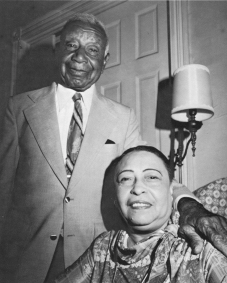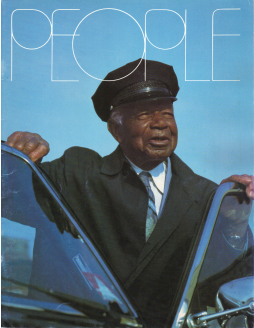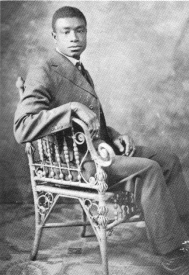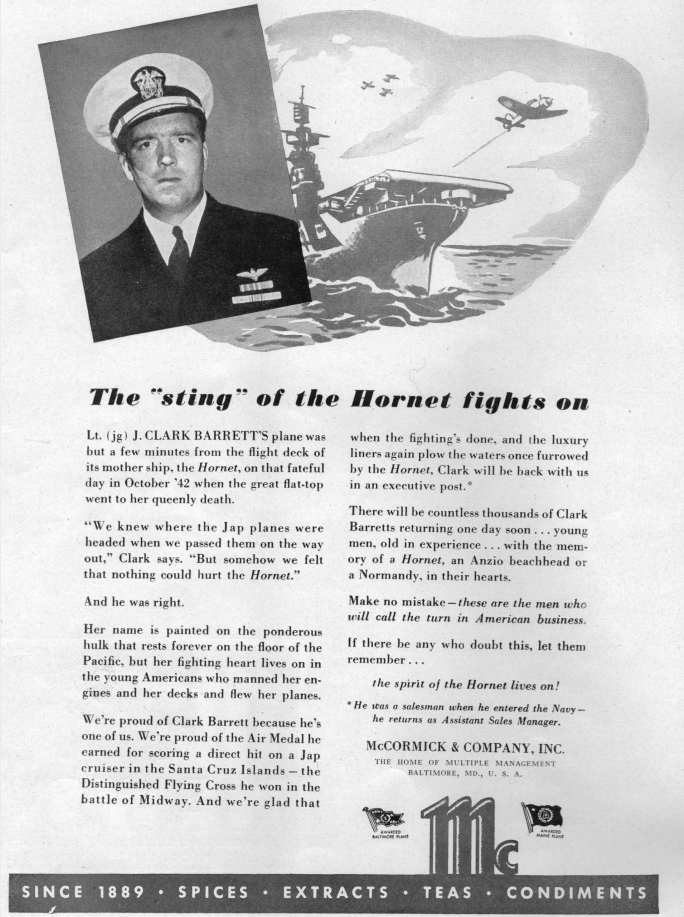


People Have Touched His Life
For sixty-two years, Charles Wesley Manokey, the
parking
lot attendant at the GPD Light Street Plant’s
Charles is McCormick’s oldest employee, both with
his sixty-two
years of service and his age. For
years,
people have tried to find out his age.
He maintains with a laugh that it’s a “military
secret,” although he
admits he celebrated another birthday in October.
In 1915, Charles began working as a private
chauffeur for
Willoughby McCormick, the founder of McCormick and Company. Raised on a farm in
During World War I, Charles took a military leave of
absence for nine months. “I
was willing
to do anything to win the war except kill another man,” said Charles. “So, I was put to work in
a munitions
plant. After the
Armistice was signed, I
came right back to work for Mr. McCormick.
Willoughby McCormick, was in Charles’ opinion, a
“mighty
fine man.” “Mr.
Willoughby was like a
father to me,” Charles reminisced.
“He
was very easily approached and, although I wasn’t in trouble very
often, he
always gave me a chance to tell my side of the story.
He had steel-grey eyes and could look you
through. Business
was his hobby. He
was always in a hurry. I
can remember driving Mr. and Mrs. McCormick
to a funeral and the service was delayed.
Mr. Willoughby walked out of the church, sat under a
tree, pulled out
his briefcase and read until the service.
He was never idle.”
Willoughby McCormick had a kind heart according to
Charles. “On
Sundays, he usually visited
the sick either at home or in the hospital,” said Charles. “On the Sunday before his
death, he paid a
call on a friend of one of our employees.
After hearing the family’s needs, he ordered two
tons of coal to be
delivered to their home. He
was and
outstanding churchman who aided many in distress.”
According to Charles, Mrs. Willoughby McCormick was
“a
lovely, quiet lady, deeply interested in music and the opera. Before she married, she
was a music teacher.”
After Mrs. Willoughby McCormick’s death, Charles
became
the Company chauffeur in 1948, driving a black Cadillac for Charles P.
McCormick and other McCormick executives.
“Mr. and Mrs. Willoughby McCormick never had any
children, but their
nephew, ‘Mr. C.P.’, measured up very well,” said Charles. “He was a fine man, too. You could say that Mr.
Willoughby laid a good
foundation and Mr. C.P. built upon it.
Mr. C.P. was a leader and you had no reason to fear
him either as long
as you did your job. He
was some man and
taught me many things.”
Charles P. McCormick told Charles that he could have
a
job for as long as he stayed in good health.
In a time when people retire at 65, the Company has
honored that
promise. “Of course
I’ll have a job only
as long as I behave myself,” Charles said, with a twinkle in his eye. “I love my job and I love
working. I wouldn’t
live long if I retired. Quite
a few people have touched my life and I
know I’ve gotten a little spoiled.
People know I’m doing the very best I can and
they’re very patient.”
Charles was appointed parking lot attendant of the
At 6 a.m., every weekday morning, Charles boards a
city
bus near his northwest
After the morning rush hour and during the long
hours
before the evening rush hour, Charles keeps busy moving cars for his
“customers,” trimming the small patch of grass around the building,
shoveling
snow and washing cars. “I’ve
always been
optimistic,” said Charles. “I
like to
keep moving.” When
he’s not outside, his
domain is a small, cement-block renovated machine shop that is sparsely
furnished with a table, a chair, a closet and a locker.
Numerous small Currier and Ives prints, as
well as mottoes like “Work Smarter Not Harder,” brighten the walls. In the table, Charles
keeps a packet of
yellowed newspaper clippings about McCormick and some of his favorite
McCormick
people. “I refer to
them when I’m making
a point,” Charles said.
Sometimes, Charles reminisces with employees and
visitors
about the old days of the Company.
“When
I began working at McCormick, the Company building was located at
Charles believes in short lunch breaks. “You see, I have this
parking lot on my mind
and heart and I don’t want to bother with something like lunch,” he
explained. In
September, Charles took
his first vacation in twenty-five years.
“I don’t want you to think for one minute that I’m
superstitious, but
when I first came to the Company, I was told to take a vacation,”
Charles
said. “The first
night of vacation, I
received a telegram telling me my father was ill.
He died five weeks later.
The next year, I went on vacation and my
second wife, who had been ill, passed away the first day.”
Charles explained that his first wife died before he
joined McCormick. In
1948, he married
Elizabeth, his third wife, a tall striking woman, with a warm
personality. “I
don’t know why she wants to stay with me
but the Lord must think I need someone,” Charles said, with a laugh. Elizabeth and Charles live
on
Although he had to leave school during the sixth
grade to
help his father farm, Charles has educated himself in his spare time by
reading. “
Charles Wesley Manokey, an ageless, soft-spoken,
articulate and wise gentleman, has received many honors, including a
C.P.
McCormick wreath award, both for his loyal service to the Company and
in
appreciation for the lives he’s touched.
“I’ve known five generations of McCormicks,” said
Charles. “I’m
thinking of staying on ‘til I see the
sixth.”
